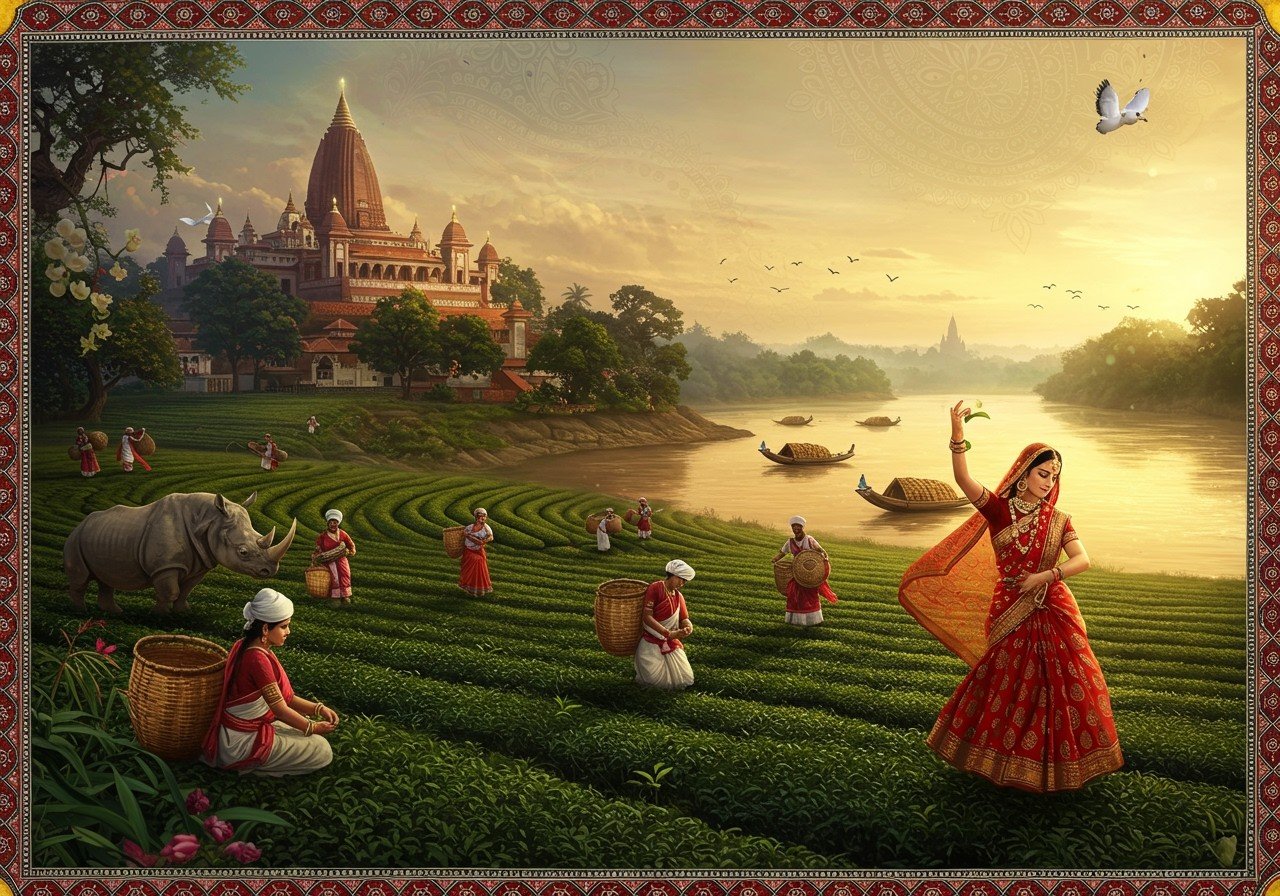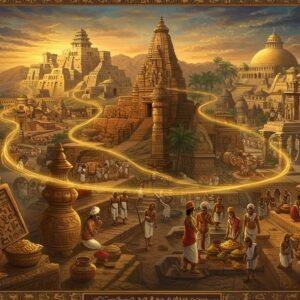
Assam, nestled in northeastern India, boasts a captivating history shaped by diverse cultures, including Austroasiatic, Tibeto-Burman, Tai, and Indo-Aryan influences. The name “Assam” originates from “asama,” meaning “peerless” in the Ahom language. Historically, Assam formed a part of the ancient kingdom of Kamarupa, with its capital at Pragjyotishapura (present-day Guwahati). Neighboring states like Arunachal Pradesh, Nagaland, Mizoram, and Meghalaya were once part of Assam. In 1972, the capital shifted from Shillong to Dispur. Assam’s historical narrative encompasses dynastic reigns, invasions, colonial rule, freedom struggles, and the post-colonial era.
Ancient History of Assam
Assam’s ancient history is truly captivating. The prehistoric period reveals evidence of human settlements as early as the Neolithic age, marked by discoveries of tools and pottery. The ancient kingdom of Kamarupa, flourishing from the 4th to the 12th century CE, played a pivotal role in shaping Assam’s trajectory. King Bhaskar Varman of Kamarupa fostered diplomatic ties with the Chinese emperor, promoting cultural exchange.
Hinduism and Buddhism profoundly influenced Assam during this era, leading to the construction of temples and monasteries as centers of worship and learning. The Ahom dynasty, reigning for almost 600 years, introduced administrative reforms and enriched the cultural landscape. Ancient texts like the Kalika Purana and Yogini Tantra offer valuable insights into Assam’s historical and religious context, shedding light on the evolution of the Assamese language and literature.
Medieval History of Assam
The medieval period witnessed the dominance of the Ahom dynasty, which arrived in the early 13th century. The Ahoms implemented administrative innovations like the Paik system, organizing people for military and civil duties. Skilled in military strategies, Ahom rulers successfully defended Assam against Mughal invasions. Their patronage of arts, literature, and architecture significantly contributed to the region’s cultural heritage. Trade and commerce thrived, and the coexistence of Hinduism, Buddhism, and indigenous beliefs showcased Assam’s religious diversity. The arrival of Muslim traders further enriched this vibrant tapestry.
Colonial History of Assam
The British annexation in the early 19th century ushered in significant transformations. The introduction of tea plantations reshaped Assam’s agrarian economy, although it also led to the exploitation of natural resources. Colonial rule restructured administrative divisions and imposed new laws. Assamese leaders actively participated in resistance movements against British rule, contributing to India’s struggle for independence. Western education and literature left a lasting impact on Assamese society, and the development of infrastructure like railways and roads shaped the region’s economy and politics.
Post-Independence Assam
Post-independence, Assam navigated numerous challenges while integrating into the Indian Union. The pursuit of Assamese linguistic and cultural identity fueled socio-political movements like the Assam Movement. Economic developments included industrial growth and agricultural modernization. A cultural renaissance witnessed the revival of traditional arts, literature, and festivals. Environmental concerns like deforestation and climate change significantly impact the Brahmaputra River. Assam plays a vital role in contemporary Indian politics, and ongoing efforts strive to preserve its rich cultural heritage through governmental and non-governmental initiatives.
Poojn.in: Connecting You to Assam’s Heritage
Poojn.in empowers you to uphold Assam’s rich cultural traditions with our authentic puja and ritual items. We offer a diverse range of products essential for Assamese religious practices:
- Pure Brass Bell and Ghanta: Traditional Assamese worship incorporates these sacred items for ceremonies and daily prayers. Our collection showcases authentic brass bells crafted by skilled artisans. Explore our brass collection.
- Authentic Assamese Gamcha: We offer pure cotton gamchas traditionally used in Assamese rituals and ceremonies. Find authentic gamchas here.
- Dhoop and Incense: Discover traditional Assamese incense varieties used in temples and homes across the region. Browse our incense selection.
- Copper and Brass Utensils: Find essential items for performing various Assamese rituals, including the tal (cymbals) and traditional water vessels. Shop our utensil collection.
Our products cater to both daily worship and special occasions in Assamese culture. Each item on Poojn.in comes with detailed information about its use and significance in Assamese traditions. We ensure all products meet religious standards and are sourced from reliable manufacturers. Visit Poojn.in to explore our full range of Assamese puja items. We deliver across India, enabling you to maintain your cultural practices wherever you are. Our customer service team can guide you in selecting the right items for specific Assamese rituals and ceremonies.
Conclusion
Assam’s vibrant history stands as a testament to its rich culture and resilient spirit. From ancient civilizations to powerful kingdoms, colonial upheavals, and post-independence transformations, Assam’s journey has been marked by strength and pride. The confluence of Hinduism, Buddhism, indigenous beliefs, and later influences has shaped its unique heritage. The contributions of rulers, leaders, and the common people have woven a captivating narrative that continues to inspire. Today, Assam embodies a harmonious blend of tradition and modernity, and preserving its cultural heritage while embracing progress is vital for its future.
Exploring Assamese Spiritual Heritage
Assam’s Sacred Sites


